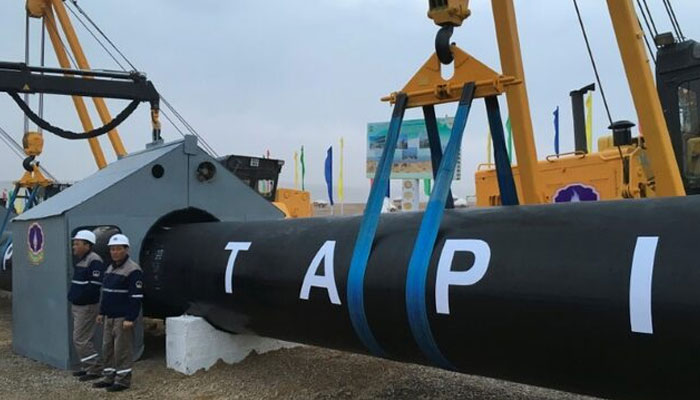
- Pakistan will be given “transit fees worth $500 million annually” without India.
- TAPI aims to bring natural gas from the gas field in Turkmenistan.
- Officials say that without India, the gas pipeline would not be sustainable for Pakistan.
ISLAMABAD: Senior Pakistani officials are considering withdrawing from the $10 billion, 1,849-km Turkmenistan-Afghanistan-Pakistan-India (TAPI) gas pipeline project if India does not want to become part of it, officials said.
The transnational project without India will become a TAP project, which will not be sustainable for Pakistan anymore. “A senior man from the oil department sensitized the GHQ (General Headquarters) a few days ago and informed them that India’s response has been very lukewarm towards the project,” the officials said. “Without India, Pakistan will have to pay transit fees of $500 million annually excluding the gas price of Rs. $7.5 per million British thermal units.
The price of gas from Turkmenistan will exceed the expensive price of LNG, they said, adding that this is how the country has to pay $5 billion annually, which is not sustainable. Background discussions with senior energy and SIFC officials also indicate that if India remains part of the project, Pakistan will receive transit fees from Delhi of $700-800 million annually.
In this way $200-300 million can be saved annually just in transit fees and gas price from Turkmenistan which will be economical for Pakistan. In this scenario, India has to pay transit fees separately to Afghanistan and Pakistan. The TAPI gas pipeline project aims to bring natural gas from the Galkynysh gas field (formerly known as South Yoloton) in Turkmenistan to Afghanistan, Pakistan and India.
The 56-inch-diameter pipeline will transport up to 33 billion cubic meters (3.2 billion cubic feet on average) of natural gas annually over 30 years. Pakistan and India will each receive 1.35 billion cubic feet per day and 500 million cubic feet per day for use in Afghanistan.
From Afghanistan, you must enter from Herat and Kandahar to Shaman. It will pass through Zhob, DG Khan, Multan and will reach Fazilika (Pak-India border) to enter India. Turkmenistan will receive an 85% share in the project, while Afghanistan, Pakistan and India will each receive 5%, worth $200 million.
India did not completely withdraw from the project, but was cautious and non-committal due to security challenges and the evolving political situation in Afghanistan and Pakistan. India had earlier withdrawn from the IPI gas pipeline, and in return got a lucrative deal from the United States.
As for Pakistan, gas consumption has decreased by 150 million cubic feet per day per month. In the current calendar year, the gas pressure in the form of line package pressure has increased to an alarming figure of 5 billion cubic feet (Bcf) for about seven times, putting the national gas transportation system at risk due to the uselessness of gas in the country.
Pakistan currently imports 10 LNG cargoes (9 from Qatar and one from Eni), but fails to fully consume the imported gas. Due to this issue, Pakistan has officially asked Qatar to reschedule five LNG cargoes scheduled to be imported in 2025. The country will receive those cargoes in 2026 under the flexible clause.
The authorities are also trying to advance the plan to suspend the import of 13 more LNG cargoes scheduled to arrive in Pakistan in 2025, or Qatar may stop exporting 13 cargoes to Pakistan.
“LNG consumption has now started to decline by 150 million cubic feet in one month, which means that 18 LNG cargoes in 2025 will turn into additional cargoes mainly due to lower GDP growth in the country and lower industrial activities,” the officials said. “.
Under this scenario, without India, the TAP (Turkmenistan-Afghanistan-Pakistan) gas pipeline would not be sustainable for Pakistan and it cannot consume gas through this project at more than the cost of LNG.
Most importantly, despite the October 2023 deadline, Turkmenistan has not yet achieved full financial closure of the TAPI gas pipeline. The project, which aims to transport natural gas from Turkmenistan to India via Afghanistan and Pakistan, has faced major challenges over the years, including security concerns, financing issues and geopolitical tensions.
For India, the TAPI pipeline is a large-scale infrastructure project that requires significant investments. India’s energy security needs are critical. But there are concerns about whether the cost and potential return on investment will justify India’s involvement, especially in light of long-standing stability issues in Afghanistan and Pakistan.
There are reports that India is exploring other options to diversify its energy mix, including LNG imports, renewable energy projects and other regional energy corridors. As a result, India’s energy strategy has shifted in favor of more stable and secure alternatives, reducing the urgency to pursue TAPI.
Turkmenistan is seeking legislative cover from Pakistan for the Foreign Investment Promotion and Protection Act (FIPPA) 2022 for its investments in Pakistani territory under the TAPI gas pipeline. Pakistan refused to grant FIPPA status because Afghanistan and India did not provide Turkmenistan with this kind of coverage.
However, Pakistan has already ensured the protection of Turkmen investment through a sovereign guarantee under the Host Government Agreement (HGA).
Originally published in The News



